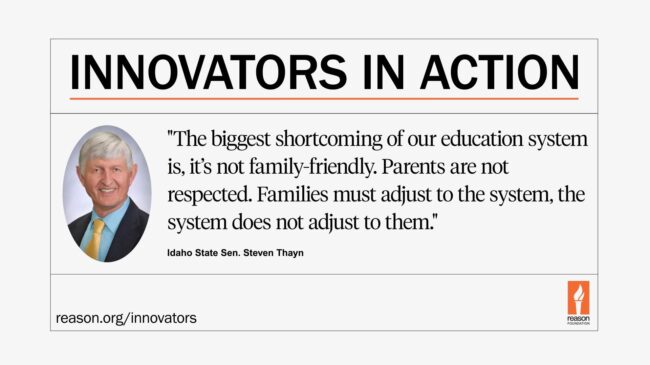In 2016, Idaho adopted the Advanced Opportunities program, an innovative approach to giving flexibility and educational choice to K-12 students. Through this program, all students in 7th through 12th grade are given a one-time sum of $4,125 in a state-managed account that can be used for college credit courses, exam fees, overload courses, workforce training, and mastery-based course credits. Though recently expanded to non-public school students, the program has been almost entirely used by public school students and has been extremely popular. In the 2020-2021 school year, 37,880 Idaho students used the program, including more than half of the state’s high school juniors and seniors.
A chief advocate for Advanced Opportunities was State Sen. Steven Thayn (R), the current chairman of the Idaho Senate Education Committee. The senator has a track record of sponsoring winning legislation that gives students more education options and pathways to early success. Our conversation has been condensed and edited for clarity.
Barnard: What do you think are the biggest shortcomings of the American public education system today?
Sen. Thayn: The biggest shortcoming of our education system is, it’s not family-friendly. Parents are not respected. Families must adjust to the system, the system does not adjust to them. I’m trying to make the system a customer-centric system where they adjust to the needs of the customers, which are families really. The question that you might ask yourself how much of the money do parents spend or have any say in what’s spent. They don’t have any say at all. They have nothing. They have to adjust to the system, so it’s very anti-family.
Barnard: Could you tell us a little bit about what kind of legislation you were interested in, leading up to the Advanced Opportunities program?
Sen. Thayn: They’re all focused on the same thing, giving choices to parents. I don’t know how philosophical you want to get in this interview, but if you’re coming from a limited government perspective, I’m not sure that there’s a national construct how to reduce the size of government other than cut programs, because people don’t understand how government grows. Government grows because it assumes responsibility, and responsibility is the marker of power. If you want to empower families or you want to reduce the size of government, you have to transfer responsibility back to families because that’s the institution that counterbalances government–families. Yeah, we’ve lost sight of that. How do you get people to accept responsibility because you can’t mandate it? All you can do is bring them close to it by giving them a choice. All of my bills are about giving parents choices so they can decide to accept responsibility or not. They’re not required to.
Barnard: Let’s talk about the Advanced Opportunities program then. Could you just briefly explain how the program works?
Sen. Thayn: Sure. The construct is fairly simple. You have a government program where, if students want to, they have a set of choices: dual credit, AP tests, summer classes, workforce training now, and career technical education exams. They can decide how to use the choices, that’s up to them, we just have a structure. Not only do they have the choices, but we provide some funding so they can really follow those choices. A local high school near where I lived prior to Advanced Opportunities had a corporate sponsor who said, “I’ll pay for all the dual credit classes.” It was a poor high school. So they went from about 300 dual credits to almost 1200 in one year. The impediment wasn’t the intelligence, or intellect, or desire of the students, it’s that they didn’t have any funds to pay for the classes.
Barnard: Why do you think the program has been so popular?
Sen. Thayn: Because students have desires to succeed. Students that have a vision of where they’re going start to understand that they can escape the mediocrity of a regular high school class, get college credit, which will move them along their path. It unleashes the vision that students have for their own life.
Barnard: What’s interesting about Advanced Opportunities is that most students being served are public school students. They don’t have to go to a charter school or a private school to have more education options. Do you think that’s an advantage of the program? Is that one of the reasons that it’s so popular?
Sen. Thayn: Yes, it is. The reason we went that way is I have some issues with charter schools and other types of school choice because you’re still funding an institution. I’m interested in funding families, I don’t care where the families are. Most of the families in Idaho, because we have a very strong public-school tradition, are in public school. If I neglected that part and tried to provide choices for just those not in public school, there’s 90% of the parents I’d never have anything to do with. Just like you follow the money, well you have to follow the parents. What’s the number one problem with public education? It’s not parent-friendly because they don’t have choices. What does Advanced Opportunities do? It’s family-friendly because it provides some choices and funds the choices.
“What’s the number one problem with public education? It’s not parent-friendly because they don’t have choices. What does Advanced Opportunities do? It’s family-friendly because it provides some choices and funds the choices.”
Sen. Thayn
Barnard: Where do the funds live and how do families access those funds? How are the providers compensated?
Sen. Thayn: It’s still being developed on the private school side. But on the public school side, they have access to a certain dollar amount of services. Each credit is $75, each summer class, like high school summer class, they can take online is $225. Every time they use a service, that amount is deducted from their account, but they never see the money. The money is sent from the Department of Education to the provider.
Barnard: Is it the Department of Ed that ultimately decides which providers are allowed to serve students and receive payment?
Sen. Thayn: Well, yes, but it’s spelled out fairly clearly in the law who can receive and they need to be located in the state of Idaho and a few other things.
Barnard: Is it a wide range of providers? What kinds of providers are popular?
Sen. Thayn: Well, community colleges are major providers. Universities do some. Some of the schools are providing some of their own. Like a school district might provide not dual credited, but high school classes during the summer. They might run a summer academy rather than take it online. Then the school would get funded through Advanced Opportunities because it’s an overload class.
Here’s another positive consequence: the popularity of Advanced Opportunities has led to the statewide standardization of core college credits since so many Idaho students are taking college courses in high school now. This has made it easier for Idaho students to transfer credits between colleges.
Barnard: What pushback have you gotten about the program?
Sen. Thayn: The major pushback has been from traditionalists in the legislature. They trust institutions more than freedom of choice. They’re also bothered by the program costing over $21 million because they don’t like that the program is controlled by the students and not them.
When the program is really working right, it should cost about $50 million. But this is the best investment of money because it’s going through families, not through the institution. It’s not going through legislators. It’s not political. It’s going directly to fund choices.
“But this is the best investment of money because it’s going through families, not through the institution. It’s not going through legislators. It’s not political. It’s going directly to fund choices.”
Sen. Thayn
Barnard: What advice would you have for other states that are considering adopting this kind of program?
Sen. Thayn: Well, I don’t know what their concerns are, so I’m not sure what advice other than one simple thing, make sure that they come up with win-win solutions. That’s what we’ve tried to do in Idaho from the very beginning. The major points of every Advanced Opportunities milestone had a Democrat cosponsor so it is nonpartisan. Make sure it’s a win-win.
Also, make the families and students the gatekeepers, not the school districts. Because unfortunately, a lot of educators don’t believe all students can be successful in dual credit classes. What the accountability in Advanced Opportunities bill is, if they don’t pass the class they have to pay for the next one and pass it before they continue. I didn’t want to limit it to just upper-class students and high performers. In Idaho, the homeless students, minority students, free and reduced lunch students—they participate at almost the same rate as their proportion of the population. It’s a few percentage points less, but it’s been pretty successful reaching out to anyone that wants to succeed.

